Photographs: Ajay Verma/Reuters Faisal Kidwai in Mumbai
Is the BJP's opposition to FDI a result of its 2004 defeat?
Why are Indians hesitant to help accident victims?
Has Indian society become apathetic?
Has materialism and consumerism made us uncaring?
Do Indians give enough to charities?
Find out in this fascinating interview.
Vivek Dehejia, economics professor at Carleton University in Ottawa, Canada, and contributor to The New York Times's IndiaInk blog, and Rupa Subramanya, who writes the Economics Journal weekly column for the Wall Street Journal, discuss these and other assumptions in their fascinating new book, Indianomix: Making Sense of Modern India.
The economists spoke to Rediff.com's Faisal Kidwai.
Could you tell us about your book?
Vivek Dehejia:: This is a rather different and unusual book about India because, although we use economics, it's not about Indian economics as such. It's not a book about economic reforms, monetary or trade policies, etc.
What we have done is we have used the tools and methods of economics and applied them to a range of interesting questions, problems and puzzles, both historical and contemporary.
The purpose of the wide-ranging book is to show readers interesting things in fun, acceptable and exciting ways.
Rupa Subramanya: Most of the books written by economists focus on policies, reforms and development, but there's more to economics than just these issues.
Of course, the issues are important, but we wanted to explore and explain why Indians are hesitant to help accident victims, whether society has become apathetic, whether materialism and consumerism have made us uncaring, etc.
of the interview...
Indian economy, missing women, BJP and cricket
Image: Vivek Dehejia and Rupa SubramanyaPhotographs: Hitesh Harisinghani/Rediff.com
Why are we so hesitant to help accident victims?
Dehejia:: It's not that Indians don't want to help the victims, but the way the incentives are set up makes it costly for them to help, because they are afraid of harassment by the police and being stuck with someone else's hospital bills.
Human beings everywhere, not just in India, have both selfish and altruistic impulses, and the incentives have to be arranged in such a manner that the altruistic impulse would come out.
One of the most important aspects of the book is how it has revealed, with the help of hard data, how assumptions and long-held views aren't necessarily backed by facts.
For instance, your take on male-female ratio challenges the theory that India has fewer females solely because parents prefer boys and abort girls.
of the interview...
Indian economy, missing women, BJP and cricket
Image: Shoppers at a mall in MumbaiPhotographs: Danish Siddiqui/Reuters
Dehejia: The conventional assumption has been that most of the missing women go missing because of sex-selective abortion or neglect in early childhood, but research shows that abortion, while an important factor, is just part of the story.
For example, in some regions and some states, more women go missing later in life. Things we see in news and are commonly asserted about India need to be scrutinised because sometimes the conventional narrative has to be probed to see if there's more to it than just a headline that says abortion is the cause of missing women.
Another assumption that you challenge is the long-held view that the Atal Bihari Vajpayee-led National Democratic Alliance government lost the 2004 general election because of the 'India Shining' campaign.
Dehejia: The received narrative is that the 'India Shining' campaign backfired against the BJP (Bharatiya Janata Party), and the party itself has accepted that narrative because it turned away from the aggressive pursuit of further economic reforms after the 2004 defeat.
But, if you look at the basic data of that elections, the difference in popular vote and vote share between the two major political groupings was not even two per cent, so, the defeat was hardly a disaster.
But the defeat itself was a surprise because all polls had predicted an NDA victory. Our argument essentially is that the difference in popular vote and vote share is too small to be attributed to one reason or cause.
of the interview...
Indian economy, missing women, BJP and cricket
Image: 'If you look around the world, including India, China and Russia, you would see rapid growth accompanied by corruption and inequality in a poor regulatory environment'Photographs: Illustration: Uttam Ghosh/Rediff.com
Subramanya: You cannot attribute that defeat solely to the 'India Shining' campaign. It could have been anything, even bad luck.
They (the BJP and NDA) would have won the election if just a few votes had gone their way.
An important point that continues to plague the BJP is that it has latched on to this idea that it lost the election because of that campaign, so now its current policy positions tend to be populist, for instance, opposing foreign direct investment in the multi-retail sector.
Let's talk for a minute about the economy in general. These days we hear a lot about 'Gilded Age.' You have also written about it.
What is the Gilded Age and why do some say that India is going through its own Gilded Age?
Dehejia: The 'Gilded Age' refers to the period after the Civil War in the United States that saw rapid economic growth, transformation of the US economy and movement of people from villages to cities.
This rapid growth was also accompanied by massive corruption and rising inequality.
So, the point that emerges from this is that if you look around the world, including India, China and Russia, you would see rapid growth accompanied by corruption and inequality in a poor regulatory environment.
The reason why there was corruption was because the regulations weren't tightly enforced and it was easy to influence politicians.
The point of the analogy is that some lessons are to be drawn by India and other emerging economies from America's Gilded Age.
of the interview...
Indian economy, missing women, BJP and cricket
Image: Women wait to vote in Sanand, home of the Tata Nano factory, in GujaratPhotographs: Amit Dave/Reuters
Do you agree with the analogy?
Dehejia: I don't agree with those who say there's a perfect match between America's Gilded Age and India's nor do I agree with those who dismiss it. The analogy does have value because it points to some interesting mechanisms that are at work.
History does offer us lessons. Very rarely do things happen in a vacuum.
You have also written that governments tend to cater to the preferred policies of voters with the country's median income. What do you mean by this?
Dehejia: In a democratic polity, political parties do try to win votes and elections, and research shows that parties will try to congregate their political platforms and policies around the so-called median voter, the person who is in the middle of everything.
So, in a country like India, a large pluralistic democracy with a large number of poor voters, the median voter in India will be relatively poor and will benefit from policies that favour redistribution over growth, at least in the short run.
The median voter who benefits from some money in the pocket is likely to support policies that push for redistribution.
And it's very hard to win elections on policies that don't offer much now, but promise more growth and income in the future.
of the interview...
Indian economy, missing women, BJP and cricket
Image: A procession of decorated elephants during the Pooram festival in Trichur, KeralaPhotographs: Reuters
You recently said there is no relationship between growth and social indicators in the short run. Could you of the interview...
Indian economy, missing women, BJP and cricket
Image: One of the richest shrines in the world, the Tirupati Tirumala Devasthanam Temple in Andhra PradeshPhotographs: Shivakant Tripathi/Creative Commons
In the book, you deny the belief that Indians are not a charitable lot by saying that Indians donate a lot to temples.
But how does donating money to temples or mosques help the needy?
Subramanya: We are not defending it or saying that you should not give to charities, but reports that claim that Indians are not generous enough cannot quantify actual charity that goes on in the country.
For instance, you might give extra money to your maid or pay for your driver's children's education. Things that typical middle-class families do, but are not reflected in international reports.
Temples historically have been places where people have given lots and lots of money.
Then there is reluctance, both in India and abroad, by people to donate their money to non-governmental organisations because they are not sure how their money would be utilised.
Our point is that Indians are charitable in their own way, but that is not captured by international reports because the charity is not done in the Western way.
of the interview...
Indian economy, missing women, BJP and cricket
Image: A scene from downtown ShanghaiPhotographs: Aly Song/Reuters
One of the most interesting stories you highlight in your book is about how August 15 came to be celebrated as Independence Day.
Dehejia: What happened was that astrologers started making dire predictions about August 15, so Jawaharlal Nehru and others tried to find a way around the date.
They came up with this idea that Nehru would begin his now famous speech, Tryst with Destiny, just before the clock struck midnight of August 15 and that way India would, technically, gain independence on August 14 and avoid the dire predictions.
So, while we celebrate August 15 as our Independence Day, the actual date is August 14.
There are many Indians who point towards China and claim that non-democratic countries see much better growth than democratic ones and therefore what India needs is some kind of a dictator. But you disagree.
Subramanya: It's an important point. It always comes up whenever we get frustrated with how things are going in our country and also when we compare ourselves with China.
People say look how developed Shanghai is and look where Mumbai is. It's understandable that people are frustrated, especially when they compare themselves to high growth countries, such as China, but not all non-democratic countries are as developed as China.
Sometimes we forget that not all authoritarian regimes are seeing high growth.
of the interview...
Indian economy, missing women, BJP and cricket
Image: The China Maritime Museum in the Shanghai Lingang Industrial ParkPhotographs: Aly Song/Reuters
Dehejia: If you look at history, rapid growth has occurred in non-democratic regimes, for the very simple reason that democracy, as we now know it, didn't exist.
We often forget that the rich European countries were not democracies until recently. The United Kingdom during the industrial revolution was not a democracy in our modern sense because most people could not vote.
Then there are other countries, such as Chile and South East Asian nations, that have seen high growth during authoritarian regimes.
All this has created an idea that non-democratic countries see better development than democratic nations.
But recent research shows that this conventional thinking could be wrong. The truth is that authoritarian countries do spectacularly well, such as China, or spectacularly bad, such as Haiti or Zimbabwe.
Democracies, such as India, tend to be somewhere in the middle.
of the interview...
Indian economy, missing women, BJP and cricket
Image: A game of cricket in MumbaiPhotographs: Danish Siddiqui/Reuters
Writing about India's favourite sport, cricket, you have said that a player making a debut at home has a better chance of surviving in the team than a player making his debut abroad. Why is that?
Dehejia: The problem with luck is that it's very hard to separate it with your own capabilities and skills.
A classic example is education, one of the main determinants of success in life. But getting into a good school is partly a matter of luck and partly your own ability.
So we wanted to find an example where we could see the direct result of luck and came across research done by two economists who looked at the debut of all major Test players and found that players making their debut on home ground have an advantage over those playing their first game abroad.
Something as accidental as place of debut can have a long-lasting impact on a player's career.





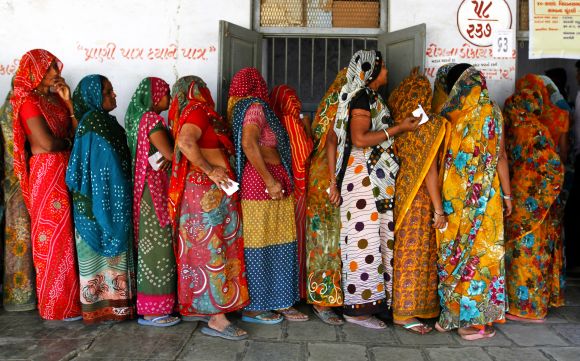
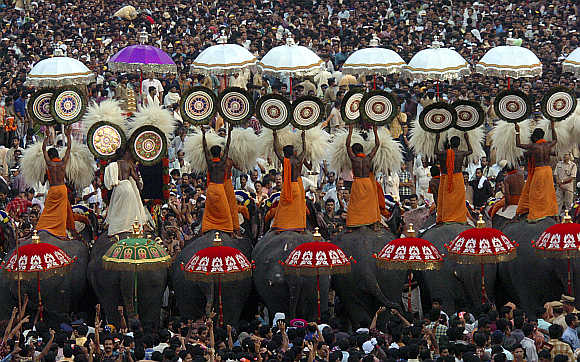
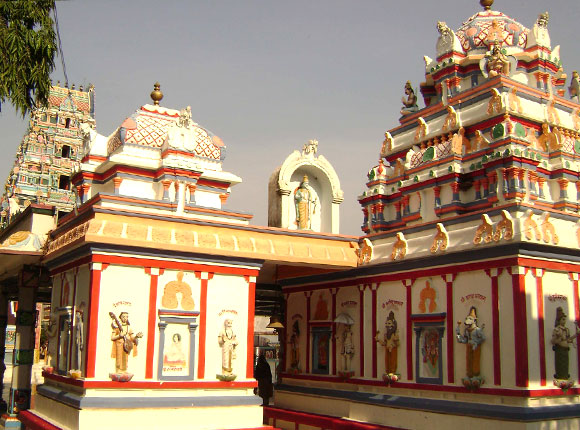
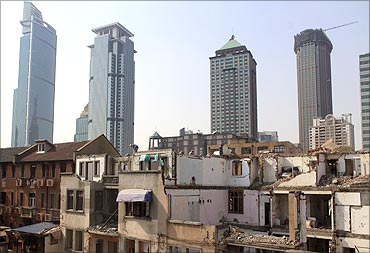
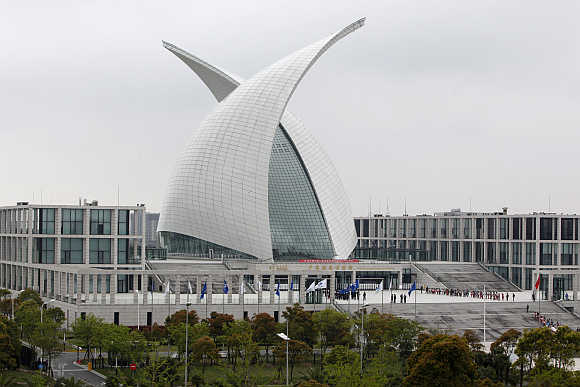
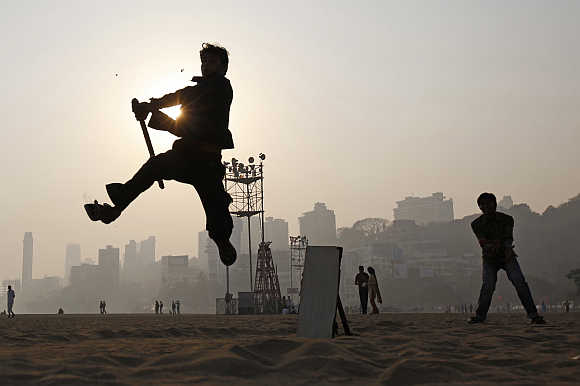
article